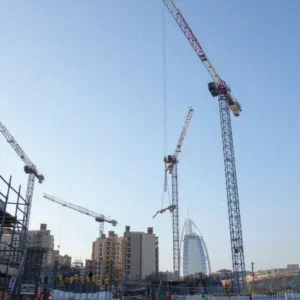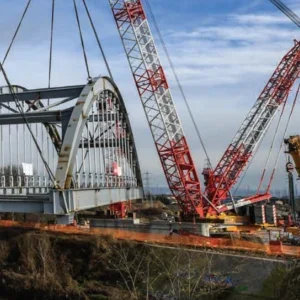Faymonville has built its reputation as a supplier of custom trailers, offering a staggering variety of options to special transport firms. Speaking at a press conference during the factory tour, general manager Alain Faymonville estimates that it may offer as many as 15,000 options in its three and four axle special trailer line.
While that level of customisation appeals to a lot of special transport firms, it pushes up prices. As the trailer market becomes more competitive, the company began looking for ways to offer cheaper products. It’s new brand, Max Trailer, aims to do that by reducing customisation to just a few options.
Increased standardisation has been only one element in the plan to cut costs. The company will be transforming its plant at Goleniow in Poland to produce the new trailers using lean production techniques, first developed at its Büllingen, Belgium, head quarters.
Yves Faymonville, production processes manager and one of the two brothers running the business, explains how the company came to Poland: "We started in Belgium, the sixth generation of a family of blacksmiths. Our father started building trailers in 1960s. They were really handmade trailers. First specialisation came with glass transport trailers. Then about 1985, came the first directional axles. In 2000, we started in Luxembourg with a new factory. In 2005 we came to Poland.
"Our biggest problem in Belgium, in our region, there is only 1.3% male unemployment. Labour costs are very high. We went to Luxemboug, found some welders there, but then the market was empty. From 1995, we had welders from Poland in Belgium and Luxembourg."
Cutting costs, keeping quality
Alain Faymonville, general manager, explains the strategy behind the new brand, "The global financial crisis has severely affected the transport sector. We’ve seen many competitors disappear. We believe they failed to cut costs effectively, just slashed prices.
"We see two customer trends. One type of customer, looks for larger and more sophisticated products. Others are less interested in sophistication, and want standardised products.
"We will continue support for existing customers under the Faymonville brand. But we will extend our range with Max Trailer. Max Trailer is designed for lighter specialised transports.
"Sales will be done wholly through dealers. We will use our network of dealers in Europe, Russia and North Africa, but we’re open to selling around the world."
Sales director Arnold Luxen will be playing a lead role in developing the Max Trailer brand. He explains, "One of the main features of the Max Trailer range is high standardization, with high quality. To achieve this, we’re using only components
"We’re using a lot of galvanized components to protect against corrosion in an optimal way. The main components and a lot of accessories are bolted on the frame. We’ll be offering Max Trailer with self steering axles, or, on demand, with fixed axles."
One of the key elements of the company’s sales approach for the Max Trailer line is an online configurator. This will allow anyone in the world to configure a trailer to their needs, picking options like gooseneck style, whether to have a ramp, and whether to have an extendable bed. Once they’ve picked what they need, the configurator will either direct them to a local dealer, or, where no dealer is available, to a central office in Luxembourg. The configurator allows the Max Trailer sales network to quickly respond to demand and quote a price, but keeps costs down.
Yves Faymonville says that controlling sales costs will be part of the strategy for Max Trailer: "Take Belgium, our home market: we have our own sales staff, but we also have a company offering sales and finance: they will be the dealer for Max Trailer, not Faymonville staff. Where the dealer is, we need a connection between the Faymonville sales guy and the Max Trailer dealer, but they remain completely separate, and we want to give Max Trailer its own identity."
Service remains vital, Yves Faymonville says, "You can only be a dealer if you have a commercial department, a service department, and a spare parts department. You have to have a garage. The salesman with a suitcase, that’s finished."
Customers will be able to keep configuring their trailers even after purchase. An assembly at the rear of the trailer makes it easy to attach a ramp as needed. The company says that an experienced mechanic can bolt a ramp in place and make hydraulic connections in under an hour. If the ramp is no longer needed, it can be removed equally easily.
The combination of a standardised design and a sales network supported by the online configurator will allow the company to achieve substantial savings, while, it hopes, still delivering a quality product. Alain Faymonville says, "It’s not complicated to produce a cheap trailer. Everyone can do it. It’s really hard to produce good trailers, cheap, and make a profit. We are nearly the only one able to do this. We’ve been working for 15 years to a lean process. What we’ve learnt at other sites, we will bring directly to Max Trailer. And we will improve lean processes as we will be reducing number of trailer types.
"Compared with the same product in Faymonville range, comparing apples with apples, we will be looking for around a 10-15% price difference. Standardisation will bring 20% of that difference; 30% building is from building in Poland; 50% is from all the logistics around the trailer, the service, transport and homologation."
Built in Poland
The Polish site will be home to the Max Trailer range. Lukasz Zuchowski, managing director, Faymonville Polska, has been with company since it set up in Goloniow in 2005. He explains that the site was chosen for its history of steel manufacturing. A nearby university has a leading welding school, and Szczecin, 40 miles away on the Baltic sea, is home to Polish shipbuilding.
Zuchowski came to the company from a career in local trailer manufacturing and other steel assembly businesses. He says, "I think one of the biggest advantages of our company in general, is that our process is really very highly sophisticated. We know exactly what we want to do. We’re implementing flow production from the automotive industry."
Zuchowski explains that a lot of the lean processes implemented at Goloniow were first developed at Faymonville’s plants in Belgium and Luxembourg in the 1990s. At Goloniow, the process has been refined to allow the company to track each component throughout the production process, allowing it to synchronise production smoothly with suppliers.
Zuchowski says, "We’re spending €5m on extending the plant, for a total investment in Poland of €18m. In coming months, we’ll take on 40 new people. When we move to full capacity usage, with 600 trailers per year, we’ll take on 100-150 people."
The line at Goloniow, and the new extension to the plant that Faymonville broke ground on during the tour, will be home to the standardised Max Trailer line. However, the company will continue to produce its more highly customised and specialist products there too. Zuchowski says, "If you want to be really flexible, to use the line fully, you want to have a mixed model system that can produce everything. Otherwise, if you have a period when there is no demand for Max Trailer, than the line is not being used. That’s why we are focussing on making one line, that can produce every type of trailer."
Zuchowski doesn’t just see lean production’s benefits to the company and its customers, but to workers on the line too: "They have clean surroundings, all tools by them, the don’t have to look around. I think it is only a quesiton of good training, good communicaiton with the team, explaining why you want to do it, what is the reason, what is the result, what is the result for the worker. It is really positive on this side. Of the people we employed in 2005, 90% are still with us."
The road to Brazil
The tight margins of the trailer industry means that companies tend to focus on their local regions. Currently, Faymonville’s reach extends, Yves Faymonville says, to North Africa, Turkey, the ex-Soviet countries and the European part of Russia. Having a plant in Poland makes the company a little more able to sell to the East, but makes it a little more expensive to sell to the West.
Despite this, the company will soon expand its reach across the Atlantic.
Yves Faymonville says, "Our next step, is a plant in Brazil, close to Curitiba. We’ve planned a joint venture there with RodoLinea, one of the five biggest trailer manufacturers, and next year we will have a new factory there. We need to ‘Brazilise’ Max and Faymonville trailers. The first step is to bring components to Brazil, but the second step will be to produce everything there.
"Production will be only for Brazilian market. The joint venture can sell out of Brazil, but then we can sell European product there."
Extending the company’s reach, both geographically and in terms of product and cost ratio will position it well for the future.
Alain Faymonville says, "In Europe, many companies have disappeared, or come back with less capacity; many should disappear, they have bad balance sheets. So, as the capacity of our competitors go down we will be positioned to compete in a stable market."






